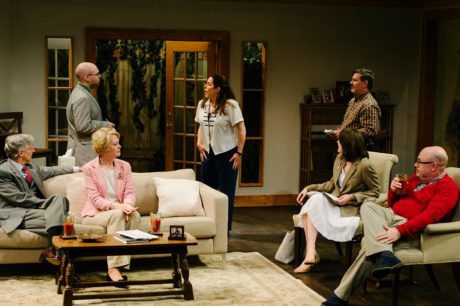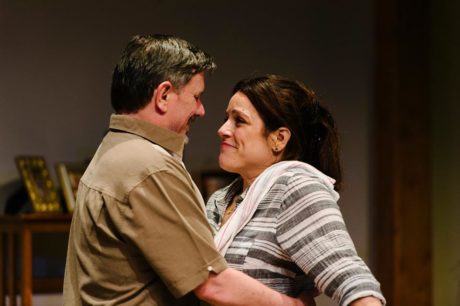We can thank the fickle fates who determine the fluky destinies of local theater programming for Keegan Theatre’s inspired late addition of Wendy Wasserstein’s An American Daughter to its spring lineup. On paper An American Daughter is a period piece, written in 1996 and set in a Georgetown living room in the 1990s. But in Keegan’s snappy and trenchant production, Wasserstein’s script crackles with witty political repartee and cracks open two prominent women’s personal pain in a way that feels as up-to-the-minute as streaming news.

An American Daughter plays rivetingly—like a Lifetime movie except with Wasserstein smarts and a castful of fascinatingly complex characters. Wasserstein wrote it just after The Sisters Rosensweig (recently also seen in DC in a terrific production, at Theater J) and said in her preface to the play,
My intention with An American Daughter was … to create a fractured fairy tale depicting both a social and a political dilemma for contemporary professional women. In other words, if Chekhov was the icon of The Sisters Rosensweig, then Ibsen would be the postfeminist muse of An American Daughter.
The main plot concerns Dr. Lyssa Dent Hughes, who has been nominated by the president to be Surgeon General of the United States. Successful in her career, happy in her marriage, devoted to her twin sons, beloved by her father, bonded in genuine sisterhood with a longtime friend, and dedicated to advocating for women’s health issues and other liberal causes, Lyssa on the surface is one of those shining new women promised by mainstream “lean in” feminism who have it all and then some.
But all is not as it seems, as in theater and life it never is.
Wasserstein complicates Lyssa’s path to confirmation by fictionalizing two real-life public humiliations for high-profile women of the era: The “nannygate” ignominy that sank President Clinton’s nominations of Zoë Baird and Kimba Wood, when it was revealed they had illegally employed undocumented workers to care for their children, and Hillary Clinton’s snark remark about not sacrificing her career for Bill’s: “I suppose I could have stayed home, baked cookies and had teas.” In both cases the arguably sexist blowback functioned to set back women’s already delimited dignity in public life.
“Nannygate” in Wasserstein’s play becomes “jurygate” when it is revealed that Lyssa has never done jury duty and once ignored a summons, which is a crime. Clinton’s quote about homemaking becomes in An American Daughter a loose-lipped comment Lyssa makes on camera disparaging her late mother’s “ice box cakes.” Both gaffes catch hold in the news cycle, and Lyssa’s ship begins to sink.
The production, directed briskly by Brandon McCoy, features many fine performances, but the actors who play the two main characters—Susan Marie Rhea as Lyssa and Lolita Marie as Lyssa’s best friend, Dr. Judith B. Kaufman, call for a special shout-out. Both characters are professionally accomplished doctors (Judith is an oncologist), and the play begins with their deep personal friendship, a model of mutual support and solidarity.
But as we learn, Judith is deeply unhappy, unable to conceive and single not by choice. She has a monologue about her unhappiness near the end of Act One that Marie fills with so much pain and anguish it almost hurts to hear. Marie’s performance is a star turn that is not to be missed.

Rhea brings to Lyssa a heart and a harriedness that are endlessly compelling. She is constantly aflutter doing domestic chores—folding laundry, arranging pillows, clearing guests’ glassware—even as no one else lifts a finger. It is a brilliant acting choice that hovers with heavy irony over the story line as Lyssa’s diss on domesticity turns the women of America against her. And equally not to be missed is Rhea’s delivery of Lyssa’s monologue near the end of Act Two during which Wasserstein brings home the personal crisis that Lyssa’s political slaughter has wrought.
There’s plenty of funny in this show. Wasserstein’s well-known knack for laugh-out-loud banter is excellently handled by the entire cast, which includes Brianna Letourneau, Mark A. Rhea, Slice Hicks, Michael Innocenti, Timothy H. Lynch, Sheri S. Herren, and Josh Sticklin. But what Rhea and Marie do when their characters are hurting is wondeful beyond words.

In the context of the current contest for the presidency, in particular Hillary Clinton’s run, An American Daughter reverberates with so much timely relevance and feminist significance that Keegan’s remodeled Church Street structure might well start to shake. It is, quite simply, a winner.
Running Time: Two hours and 30 minutes, with one intermission.
An American Daughter plays through May 28, 2016 at The Keegan Theatre – 1742 Church Street NW, in Washington, DC. For tickets, call the box office at (202) 265-3767, or purchase them online.
LINK:
Review #2 ‘An American Daughter’ at The Keegan Theatre Company by Lauren Katz.
RATING:




